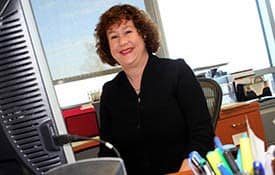UAMS Research Team Receives National Award
| 
Delia West, Ph.D., professor in the Department of Health Behavior/Health Education at the UAMS Fay W. Boozman College of Public Health, was the study’s principal investigator.
Aug. 8, 2013 | Researchers at the University of Arkansas for Medical Sciences (UAMS) have received national recognition for a study that determined the impact of two evidence-based interventions for older adults – a lifestyle weight management program and a cognition training program – both delivered by lay health educators.
The CDC-funded COACHES (Counseling Older Adults in Cognition and Healthy Eating Strategies) in May received the National Council of Aging’s National Institute of Senior Centers 2013 Research Award.
Delia West, Ph.D., professor in the Department of Health Behavior/Health Education at the UAMS Fay W. Boozman College of Public Health, was the study’s principal investigator. Cornelia Beck, Ph.D., R.N., FAAN, co-principal investigator, is a professor in the colleges of Medicine, Nursing and Public Health at UAMS and is the co-director of the UAMS Hartford Center for Geriatric Nursing Excellence.
The study was particularly noteworthy because it was based in rural settings – a rarity for translational research, especially for an intervention that addresses health needs of seniors. The study also tested the feasibility of community members, trained as lay health educators, delivering the intervention. The success of the model has important implications for broader implementation at senior centers nationally.
“The whole notion was to identify methods that were empirically solid, evidence-based programs and to translate them to rural areas that don’t have access to them,” West said. “That is why we involved lay health workers.”
The randomized, controlled trial study design was another strong but unusual aspect of the study. Though the gold standard for clinical research, RCT designs are a rarity in community-based research, because participants are reluctant to enroll at a control site at which they know they will miss out on possible benefits from the study. In COACHES, the participating senior centers were randomly assigned to either a lifestyle weight management program or a cognition training program to improve memory and reduce risk of Alzheimer’s disease and other dementias. The two groups served as the control for one another. Thus, none of the 228 people recruited to the study declined because of the group that they were assigned to.
“So everybody got something,” West said. Both the weight loss and cognitive interventions were “a draw for vital, older adults. People enjoyed the training regardless of which one they were in, and the senior centers were really keen on it.”
Seniors 60 years or older with a BMI of at least 30 participated. More than 90 percent completed the yearlong study. Fifteen senior centers in 11 counties in rural Arkansas served as intervention sites.
Those in the weight management group lost a significantly greater percent of baseline weight (average weight loss of 3.8 percent) than those in the control group (0.2 percent), and 38 percent experienced a clinically meaningful weight loss (more than 5 percent of baseline weight) compared with only 5 percent in the control group.
Among those in the cognitive training program, clinically significant improvements in delayed memory were much more likely to be observed than seen among seniors in the weight loss arm. The study concluded that behavioral lifestyle weight loss and cognitive training interventions delivered by lay health educators are promising for translating evidence-based obesity treatment and memory improvement programs in underserved rural areas.
What lies ahead if more seniors nationally might benefit from the COACHES model?
“The next step is to think through ways to train coaches in a scalable way,” West said.
Since the program concluded, “some are continuing to meet and haven’t seen much weight regain,” West said. That is an advantage that physician-based treatment programs generally are not be able to provide. “They don’t have that ongoing support,” whereas senior centers provide a continuing “built-in support system” for participants after the study’s conclusion.
In order to train staff or volunteers throughout the existing national network of senior centers with the same intensive training as provided by the UAMS team, technology may be the answer.
“Can we train them as well with a technology-based platform?” West wants to know.
The study was a collaborative effort that included the UAMS College of Public Health, the UAMS Donald W. Reynolds Institute on Aging, the Arkansas Department of Health, the Arkansas Department of Human Services Division of Aging and Adult Services, and the Arkansas Area Agencies on Aging, as well as the staff, volunteers and older adults from the participating senior centers.
In addition to West and Beck, the COACHES team was comprised of College of Public Health faculty and staff, including Zoran Bursac, Ph.D.; Carol Cornell, Ph.D.; Marisha DiCarlo; Kenya Eddings; Holly Felix, Ph.D.; Rebecca Krukowski, Ph.D., (now at the University of Tennessee-Memphis); Shelly Lensing, ShaRhonda Love, and Elaine Prewitt, Ph.D.; Becky Adams of the Arkansas Department of Health; and Jennifer Kleiner Fausett, Ph.D., and Debbie Hodges of the UAMS College of Medicine Department of Psychiatry.
In August, West will take a new position at the Arnold School of Public Health at the University of South Carolina, Columbia.
For more information click here.